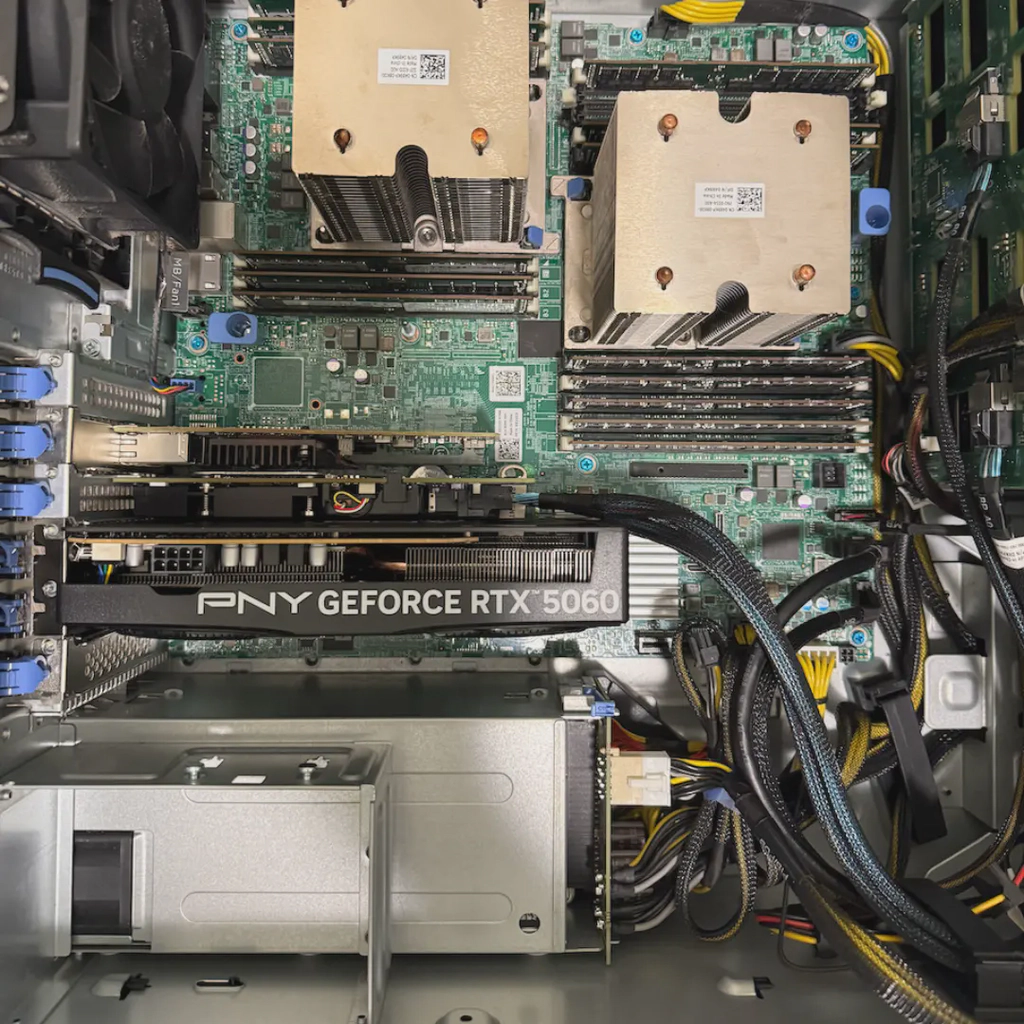Intro
I recently acquired an RTX 5060 GPU and had to look at multiple sources in order to get passthrough working. This will outline all the steps I took in order to get it working on my Dell Poweredge T440 server.
Update
At the time of the post edit, Proxmox 9 has been released. I have updated my host to the new version and used the update tool for RTX 5060 series🔗 provided by Nvidia. This runs only on Windows so I have passed-through my GPU to a windows VM in order to run the update.
I am still not able to enable the ROM BAR or primary GPU options in the VM.
Pre-requisite
I am using an ubuntu 22.04 VM with the official 6.14 kernel update. It is worth noting that I could not get this to work with the latest generic kernel installed through Ubuntu Mainline Kernel Installer. The kernel needs to be provided by canonical.
Make sure you have enabled Above 4G Decoding in your BIOS, and if available, also enable ReBAR support.
1. Proxmox Grub Configuration
In your proxmox server, open the grub configuration file /etc/default/grub and look for the line GRUB_CMDLINE_LINUX_DEFAULT and modify it to look like this:
GRUB_CMDLINE_LINUX_DEFAULT="quiet intel_iommu=on iommu=pt pcie_acs_override=downstream,multifunction nofb nomodeset video=vesafb:off,efifb:off"If you are using an amd cpu, change intel_iommu=on in favour of amd_iommu=on.
Save and close it, and issue the command update-grub. To ensure IOMMU has been enabled successfully, reboot your server and issue the command dmesg | grep -e DMAR -e IOMMU, you should see a line akin to:
[ 0.537225] DMAR: IOMMU enabled2. Proxmox VFIO Kernel Modules
Edit /etc/modules and add the following lines to the end of the file:
vfio
vfio_iommu_type1
vfio_pci
vfio_virqfd3. Configure Proxmox VFIO Options
Issue the following commands:
echo "options vfio_iommu_type1 allow_unsafe_interrupts=1" > /etc/modprobe.d/iommu_unsafe_interrupts.conf
echo "options kvm ignore_msrs=1" > /etc/modprobe.d/kvm.confThese options help VFIO handle interrupt mapping and MSR access for GPU passthrough.
4. Blacklist NVIDIA drivers
Issue the following commands:
echo "blacklist nouveau" >> /etc/modprobe.d/blacklist.conf
echo "blacklist nvidia*" >> /etc/modprobe.d/blacklist.conf5. Bind the GPU to VFIO
Now, we need to tell Proxmox to bind the VFIO driver to our GPU. To do this, first you need to find out the gpu ids.
Issue the command lspci -nn | grep NVIDIA. You should get an output like:
root@pve:~# lspci -nn | grep NVIDIA
af:00.0 VGA compatible controller [0300]: NVIDIA Corporation Device [10de:2d05] (rev a1)
af:00.1 Audio device [0403]: NVIDIA Corporation Device [10de:22eb] (rev a1)Note down the PCI IDs, particularly: 10de:2d05 and 10de:22eb. These hex values identify your specific GPU model and audio controller.
Issue the command echo "options vfio-pci ids=10de:2d05,10de:22eb" > /etc/modprobe.d/vfio.conf, replacing the IDs appropriately.
Afterwards, run update-initramfs -u and reboot your server.
6. Attaching the GPU to the VM
First, ensure your VM is off. Then, to attach the GPU to the VM, navigate to the Hardware settings and select Add -> PCI Device. Click on Raw Device and search for the GPU in the dropdown. It should look as follows:
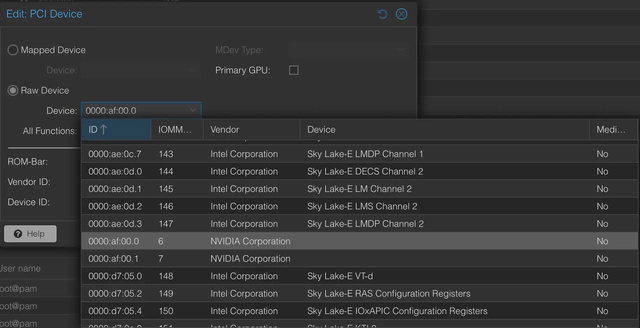
Make sure to Enable All Functions and PCI-Express while keeping ROM-Bar and Primary GPU unchecked.
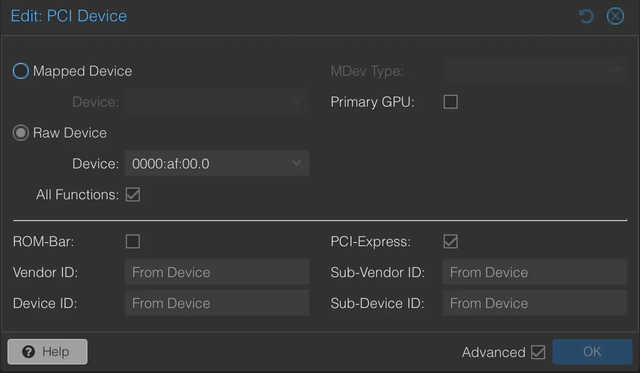
If you prefer GUI access to your system, make sure Display is set to default.
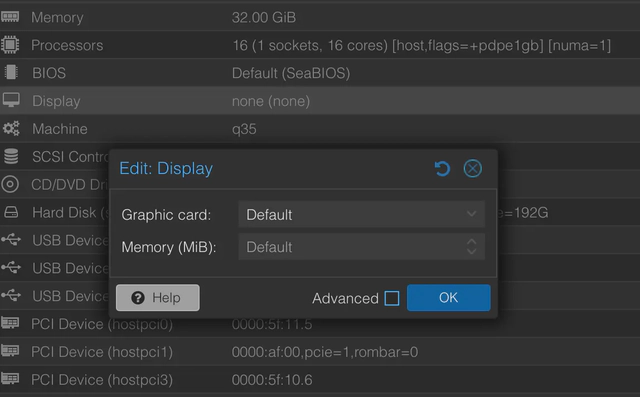
Now, turn on your vm.
7. Install the NVIDIA Drivers
For the card to work correctly, you need to install the latest nvidia-open drivers (575 at the time of writing this).
First, uninstall any old drivers:
sudo apt-get remove --purge '^nvidia-.*'
sudo apt autoremove
rebootThen, install some dependencies:
sudo apt install pkg-config libglvnd-dev dkms build-essential libegl-dev libegl1 libgl-dev libgl1 libgles-dev libgles1 libglvnd-core-dev libglx-dev libopengl-dev gcc make Finally, install the drivers and reboot:
sudo add-apt-repository ppa:graphics-drivers/ppa
sudo apt update
sudo apt install nvidia-driver-575-open
rebootTo confirm everything works as intended, run nvidia-smi. You should see a screen like:
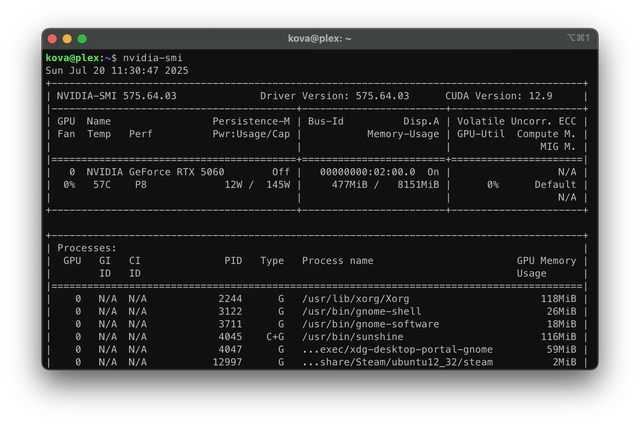
Make sure to disable the default display so that the system uses the NVIDIA GPU as its primary GPU. It is worth noting that ROMBar and Primary GPU options under the hardware tab should be disabled, otherwise the system will be prevented from booting up.
Done!
If all the steps have succeeded, you should have passed through your RTX 5000 series GPU.
Resources
Thanks to these resources for useful information.
- u/cjalas’ guide to passthrough
- oddmario’s nvidia ubuntu driver guide
- Nvidia 5000 series passthrough proxmox thread
